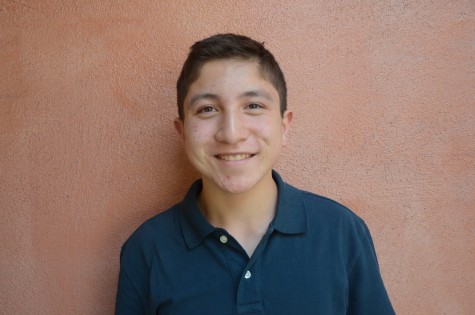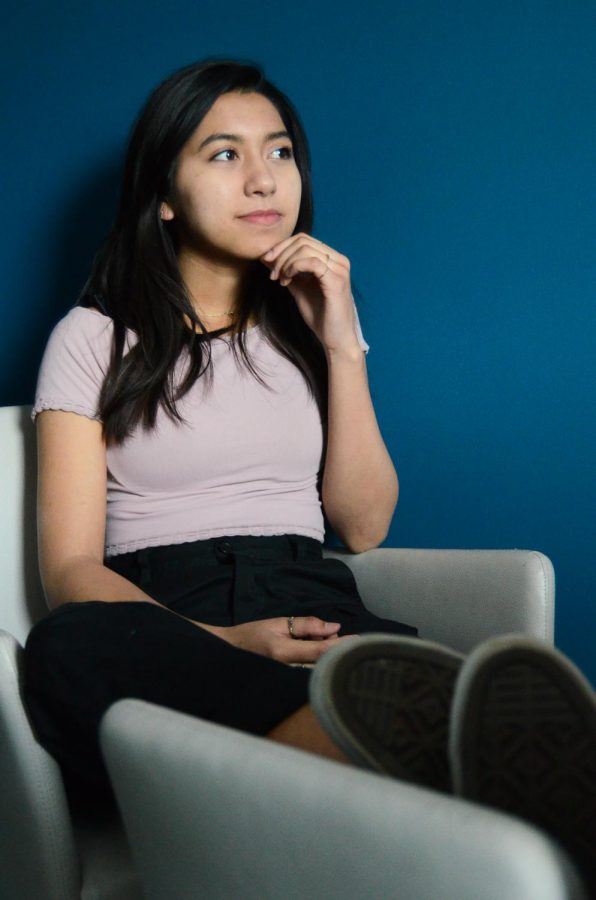Humans of Harker: Realizing confidence
Sophia Angus discovers fortitude through lifeguarding
“For a long time, I thought that confidence was being present and there, and making people know that you were there, and being comfortable taking things that you want. I realized that was just a by product of what confidence really is: being okay with who you are in that moment and on that day. Lifeguarding taught me a lot about trusting myself; I also just think that it is really bad ass that I can save people’s lives,” Sophia Angus (12) said.
Lifeguard chairs, an elevated lattice of white plywood topped with a bright colored umbrella, resemble thrones: often they come with a sense of authority, responsibility and ability. If you happen to stop by Santa Clara Swim Club on a weeknight, and you were to look up at the lifeguard chair, you would see Sophia Angus (12) wearing her calm and welcoming smile, scanning the pool deck, ready at a moment’s notice.
“It’s just me, and I can think through everything that happened during my day, and just know that I’m capable of all these things,” Sophia said.
As a trained lifeguard, Sophia is able to rescue a person in need and help bring them to safety; as an experienced performer, she has acute control of her voice and assuredly executes her upbeat choreography on stage. She is the image of confidence and the essence of tenacity with a hit of familiarity, but her brand of confidence did not always come second nature. It was a journey.
“I thought that confidence was like being big in the room that you’re in and filling up your own frame and taking up a lot of space,” Sophia said. “I think it’s easy, when you think about confidence that way, to fake that, so I would walk around with a smile plastered on my face. But I am more introverted than a lot of people think I am.”
Many around her seemed to become accustomed to Sophia extroverted self, which got her questioning where she could realize own confidence and how she should define it. Because she lives far away from school, much of her time and identity was centered around school activities, until she found the opening position as a lifeguard at a pool local to her house.
Lifeguarding was just for her since only close friends knew about her job and hobby. There, she discovered her own definition of confidence.
“I also think it is just really bad–s that I can save people’s lives,” she added.
But when she started out she was unsure of herself and if she could interact her coworkers: a new group of intimidating older high schoolers.
“I had to learn how to be strong in my ability to command respect because none of them knew who I was and physically I am pretty small and they are not,” Sophia said. “I had to figure out how to relate to them and their experiences because none of them have had the opportunities I have had at Harker.”
As her history teacher Roxana Pianko, who taught Sophia in World History sophomore year then “Genocide and Holocaust” senior year, noted, Sophia possesses a high level of emotional intelligence to connect with any people she meets. Her maturity translates to how she approached the classroom material.
“When you talk about something like genocide and Holocaust, its a reaction that you have to almost want to remove your feelings from it because its too much,” Pianko said. “I saw so much emotional maturity in her because she was willing to engage fully, even if that meant that her voice was going to crack or she was going to shed some tears, she still did it.”
For Sophia, allowing herself to be emotionally vulnerable took a courage that she built throughout high school, a change that Pianko also noticed between Sophia’s sophomore and senior years. In addition to the confidence she found in the classroom, Sophia also built upon it in her everyday social life.
When her friend Tamar Sasson (12) was going through challenging times two weeks before spring break, Sophia took the time to bring little gifts to Tamar every day before the break to try to make her day better.
“She also asked me how I was doing all the time, and she was very reassuring that she was there for me,” Tamar said. “Even if I couldn’t talk about it a lot, I could share my emotions with her, which was really comforting and nice because I don’t think I’ve really had a friend who was so upfront about being able to talk to her about stuff.”
Tamar believed that Sophia’s compassion exemplified her great emotional intelligence and added that “at this point, Sophia is like a sister to me. It’s nice to have someone who you don’t have to feel like you have to filter yourself around.” Pianko noticed the same kind of emotional maturity when Sophia led class discussions about topics regarding genocide.
“She has enough self awareness to be able to be there for people and to know that this is the appropriate time to sit back and listen versus the need to take the lead and talk,” Pianko said. “I think that she has an understanding of what the people in her life need and I think that she has learned how to be a good helper, how to be a good friend, how to be a good listener.”
Now when Sophia sits up on her lifeguard chair for late night swimming on a Wednesday night, she feels at peace. It is quiet and cool, and steam from the pool’s illuminated turquoise surface quickly evaporates away. She listens and scans, proud that she is trusted with watching over and protecting people.
“The confidence that I was faking became real,” she said. “It’s really humbling to realize that someone trusts me, and they’re right to trust me because I can handle all these people. In case anything happens, I’m there and I’m ready and I know what I’m doing.”

Zachary Hoffman (9) is a reporter for the Winged Post. Since first grade he has attended Harker, and he looks forward to writing about school-wide events....


















![“[Building nerf blasters] became this outlet of creativity for me that hasn't been matched by anything else. The process [of] making a build complete to your desire is such a painstakingly difficult process, but I've had to learn from [the skills needed from] soldering to proper painting. There's so many different options for everything, if you think about it, it exists. The best part is [that] if it doesn't exist, you can build it yourself," Ishaan Parate said.](https://harkeraquila.com/wp-content/uploads/2022/08/DSC_8149-900x604.jpg)




![“When I came into high school, I was ready to be a follower. But DECA was a game changer for me. It helped me overcome my fear of public speaking, and it's played such a major role in who I've become today. To be able to successfully lead a chapter of 150 students, an officer team and be one of the upperclassmen I once really admired is something I'm [really] proud of,” Anvitha Tummala ('21) said.](https://harkeraquila.com/wp-content/uploads/2021/07/Screen-Shot-2021-07-25-at-9.50.05-AM-900x594.png)







![“I think getting up in the morning and having a sense of purpose [is exciting]. I think without a certain amount of drive, life is kind of obsolete and mundane, and I think having that every single day is what makes each day unique and kind of makes life exciting,” Neymika Jain (12) said.](https://harkeraquila.com/wp-content/uploads/2017/06/Screen-Shot-2017-06-03-at-4.54.16-PM.png)








![“My slogan is ‘slow feet, don’t eat, and I’m hungry.’ You need to run fast to get where you are–you aren't going to get those championships if you aren't fast,” Angel Cervantes (12) said. “I want to do well in school on my tests and in track and win championships for my team. I live by that, [and] I can do that anywhere: in the classroom or on the field.”](https://harkeraquila.com/wp-content/uploads/2018/06/DSC5146-900x601.jpg)
![“[Volleyball has] taught me how to fall correctly, and another thing it taught is that you don’t have to be the best at something to be good at it. If you just hit the ball in a smart way, then it still scores points and you’re good at it. You could be a background player and still make a much bigger impact on the team than you would think,” Anya Gert (’20) said.](https://harkeraquila.com/wp-content/uploads/2020/06/AnnaGert_JinTuan_HoHPhotoEdited-600x900.jpeg)

![“I'm not nearly there yet, but [my confidence has] definitely been getting better since I was pretty shy and timid coming into Harker my freshman year. I know that there's a lot of people that are really confident in what they do, and I really admire them. Everyone's so driven and that has really pushed me to kind of try to find my own place in high school and be more confident,” Alyssa Huang (’20) said.](https://harkeraquila.com/wp-content/uploads/2020/06/AlyssaHuang_EmilyChen_HoHPhoto-900x749.jpeg)



